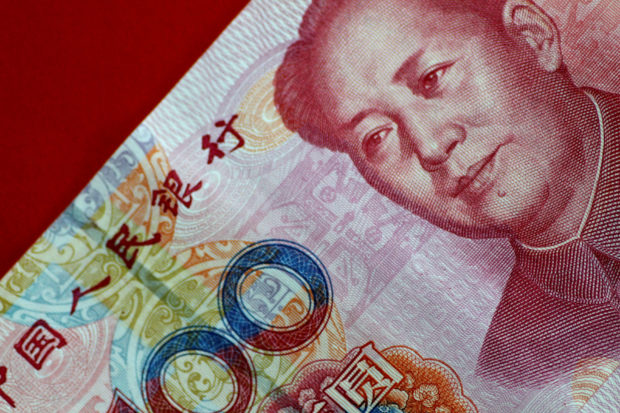
A China yuan note is seen in this illustration photo. REUTERS/Thomas White/File photo
SHANGHAI – Foreign investors continued to cut holdings in Chinese bonds in July and dumped equities for the first time in four months, according to a report by the Institute of International Finance (IIF).
Emerging markets posted a fifth straight month of portfolio outflows, setting the longest such streak in records going back to 2005, as global recession risk, inflation and a strong dollar drew away cash, showed the report released on Wednesday.
Chinese debt witnessed outflows of around $3 billion last month, while $6 billion exited other EM, IIF estimated.
If confirmed by official data, it would be the sixth consecutive month of foreign outflows from China’s $20-trillion bond market.
During the same period, China’s stock market witnessed $3.5 billion of foreign outflows, compared with marginal inflows of $2.5 billion in other EM markets, IIF added.
The benchmark CSI 300 Index dropped 7 percent, down every week in July, as domestic COVID-19 flare-ups, property woes and global recession risks weighed.
“China’s A-shares saw a range-bound, generally weaker trend since July under both domestic and overseas influences,” China International Capital Corp. (CICC) said in a note.
Data showed the world’s second-largest economy slowed sharply in the second quarter, missing market expectations with an only 0.4 percent increase from a year earlier.
With impacts from the Ukraine war still not waned, Sino-U.S. tensions over Taiwan mounted as U.S. House of Representatives Speaker Nancy Pelosi visited the self-ruled island claimed by Beijing.
“For the coming months, several factors will influence flows dynamics, among these the timing of inflation peaking and the outlook for the Chinese economy will be in focus,” IIF said.
Overseas investors have been reducing holdings of Chinese bonds since February, as diverging monetary policies kept Chinese yields pinned below their U.S. counterparts.
The People’s Bank of China has been easing policy to aid a COVID-hit economy, while the U.S. Federal Reserve has been hiking rates to fight soaring inflation.

